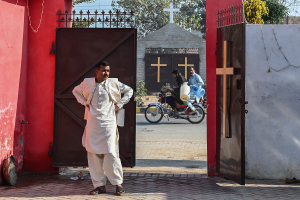Divinity Students, Inmates Find Knowledge Behind Bars
Inside the prison classroom, inmates and Vanderbilt students sit together and immerse themselves in passages from Matthew, discuss the meaning of faith and debate the discovery of the Gospel of Judas.
NASHVILLE, Tenn. (AP) – Most of the divinity students in Vanderbilt University's Writing About Religion class wear typical college attire - T-shirts and jeans.
The only thing different about some students is that their jeans have "TN Dept of Corrections" written in white down each pant leg.
The class is being held at Riverbend Maximum Security Prison in Nashville, where nearly 700 prisoners are housed and home to Tennessee's death row.
Five rows of fence topped with razorwire surround the prison, but inside the prison classroom, inmates and Vanderbilt students sit together and immerse themselves in passages from Matthew, discuss the meaning of faith and debate the discovery of the Gospel of Judas.
The class meets once a week in a sparsely equipped classroom with yellowed maps and a dirty blackboard, next to the woodworking shop. Students and prisoners move wooden chairs into a circle, and professor Ray Waddle begins the class by asking them to analyze how the term "jailhouse convert" was used in a reading assignment.
"All the great men went to prison, the way I see it - Jesus, Paul and John the Baptist," said 35-year-old inmate Rahim Buford, who was sentenced to life at the age of 18. "If you want to find out who you are, you have to be confined in some way."
The program began three years ago with faculty members volunteering their time to introduce divinity students, many of whom will go on to lead congregations, to the growing number of people who seek religion and spirituality behind bars.
"In our regular classes on campus, we talk a lot in theory about social justice and being concerned with people who are marginalized," said Leah Payne, a 26-year-old master's student from Oregon. "But sometimes that tends to make us almost patronizing, because we don't engage people who have their own sense of those issues."
The students and inmates, about five of each, do the same coursework, read the same assignments and turn in papers on the same topics. Inmates with college degrees can earn credit for the graduate class.
James Hudnut-Beumler, dean of the Vanderbilt Divinity School, said the program has opened many students' eyes to prison life beyond what they've seen on TV or in movies.
"The thing I hear again and again is that they experience the men at Riverbend as people with intelligent ideas about religion and the things they read together. And they didn't expect that," Hudnut-Beumler said.
Prisoner rights activist and Vanderbilt professor Harmon Wray designed the classes based on a theology program at Sing Sing Prison taught by faculty at New York Theological Seminary. But Wray invited students, not just faculty, to work with the prisoners.
"The difference here is that I don't think there's any other place in the country where divinity students are actually sitting in the classroom with the Riverbend students reading the same material, discussing the same material," Wray said.
"It doesn't allow one to make a judgment of them as the other, or outcasts," said Marcus Trammell, 26, a second-year master's student. "I often ask myself, 'How did they get here?' And I've found all of them to be very reflective people and very open about looking at themselves and what they've done."
Frederick Sledge, one of the youngest people to be sentenced to death in the state at age 19, told the class that it took him years to understand that prisoners don't have to feel spiritually disconnected just because they are physically disconnected.
"Here I was, looking for someone on the outside to bring the church inside, when it was inside all along," Sledge told the class.
Sledge, whose sentence was later reduced to life in prison, confessed to fatally shooting a 64-year-old man in 1991. He and two others followed Johnny Harris to his apartment, demanded money and then shot him in the back.
In past classes, students and prisoners have studied topics such as biblical interpretation in the South, the Book of Revelation and the Gospel according to Matthew, which was taught last semester by renowned New Testament scholar Amy-Jill Levine.
"They aren't only interested in classes about prison ministries or the criminal justice system," Levine said. "They wanted the hardcore academic stuff, what the historians are talking about."
The classes aren't just a challenge in an intellectually stunted environment. For some inmates who have no expectations of ever living outside of Riverbend's prison walls, the classes represent a small, precious moment of freedom.
"We're limited by the fences - we're closed-off communities," said inmate Tom Warren, 47, who is serving two consecutive life terms. "It's an opportunity to deal with the loneliness. These classes have probably saved my life."
© 2006 The Associated Press. All rights reserved. This material may not be published, broadcast, rewritten or redistributed. Learn more about our Privacy Policy.





























